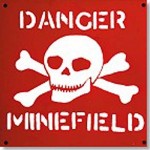What Happened to All the Scareware – For Now?
 A report from the reputable antivirus vendor “Kaspersky Labs” has indicated that the rate of fake antivirus program attacks (scareware) has decreased substantially. In June 2011, they observed between 50,000 and 60,000 attacks per day, but by October 2011, the number of attacks had dropped to under 10,000 a day. Now these are their numbers and not mine. The fact is that most all the antivirus vendors have failed miserably in protecting our computers from Fake Antivirus programs, so there is no way that they can know the real number. Otherwise, if they knew how to detect it, their software should have prevented it in the first place.
A report from the reputable antivirus vendor “Kaspersky Labs” has indicated that the rate of fake antivirus program attacks (scareware) has decreased substantially. In June 2011, they observed between 50,000 and 60,000 attacks per day, but by October 2011, the number of attacks had dropped to under 10,000 a day. Now these are their numbers and not mine. The fact is that most all the antivirus vendors have failed miserably in protecting our computers from Fake Antivirus programs, so there is no way that they can know the real number. Otherwise, if they knew how to detect it, their software should have prevented it in the first place.
I don’t know the countries where the remaining attacks were concentrated, but it seemed as if the fake antivirus business was still running strong up until about April 2012, at least here in Hawaii. My observations are not scientific and are solely based on my daily workload in removing these fake antivirus programs from customers computers, but I can tell you that there has been a “HUGE” decrease in these types of infections coming into my shop in the last 2-1/2 months or so.
Less is More?
What I have noticed though, is an increase in FakeHDD Alert programs. It is still a form of scareware, but instead of trying to deceive you into buying a Fake Antivirus program, it tries to trick you into believing that your hard drive is failing, and of course they have the supposed cure, for a fee. But I can tell you that these types of programs are much more malicious in that they move and/or hide data folders, and program shortcuts from Windows Explorer and your Start Menu.
While the overall rate of Fake Antivirus infections has dropped significantly in the last few months, it has always been a cat-and-mouse game and you can expect it to rise again. Kaspersky says the drop is due to law enforcement efforts, search engine improvements, and the disruption of cybercriminal distribution networks.
Antivirus vendors Panda Security and F-Secure also agree that shutting down the networks for some major scareware operations have contributed to the decrease.
Anyway, it is refreshing news to learn that the bad guys took a hit and that they can be beat. But I’m sure they will be back with some new tricky stuff that might catch some computer users off guard. So now is the time to ensure your computer is protected with some top-tier antivirus & antispyware programs and a firewall if you like, but more importantly, to learn how to be internet savvy enough “not” to visit bad websites or click on malicious links.
It’s a Minefield Out There!

Would a soldier in a minefield start recklessly taking steps just because he already made a few safe steps? While we really aren’t talking about life and death here with your computer, it would help if you viewed the internet as a minefield. Learning some spyware prevention techniques will be like having a map to the mine placement so you know where the dangerous areas are. And then you can view your antivirus & antispyware programs as your bomb suit to help protect you in case you unintentionally or carelessly detonate one anyway.
Just know that bomb suits don’t always protect you! So “always” be on guard and don’t get complacent when it comes to computer security and you may be one of the lucky ones who’s computer becomes obsolete before it ever breaks, not to mention preventing a little identity theft.


Leave a Reply